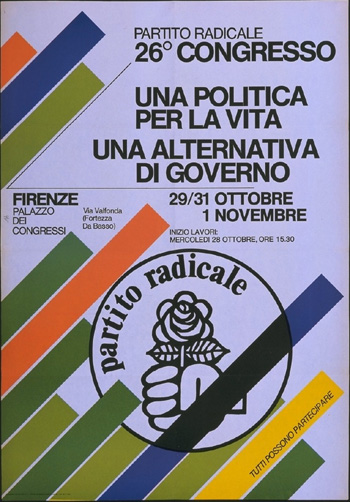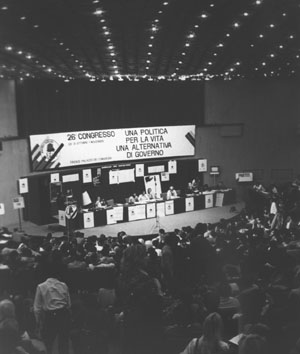|
|
|
On the crest of a pounding wave of Radical Party action, the fight against death by starvation in the world begins to take shape. In the course of the Summer of 1981 a manifesto is presented signed by 54 Nobel Prize winners. It is not a general appeal to conscience but a political document that asks the governments and political forces to mobilise for the "minimum" goal of immediately saving five million human lives. It defines this goal as a rallying point for new majorities, a new front line for measuring conservation and progress. In succeeding months a motion of the European Parliament, to which the majority subscribes, assumes the manifesto's goals as its own. In this context the XXVIth Congress does its work. The motion approved confirms the commitment against death from starvation and defines the methods and goals of this political campaign. The motion on public financing provides that these funds be used exclusively for non-Radical-Party purposes. The Congress elects Marco Pannella as Secretary and Marcello Crivellini as Treasurer.
For what this means in terms of values and hopes, from now on every political policy, every political group and every block cannot help but be measured by this fact which will be the decisive line of demarcation. Precisely because of this - because of the political choices that by now must be made, because of the yes's or no's that must be pronounced in the coming days - every day and every hour of delay can only produce the daily extermination of 50,000 people; an all the more hateful and aberrant extermination, morally and politically intolerable, in that a practical project exists to save lives that otherwise are condemned to death from hunger and malnutrition, from starvation and under-development; a project that has been solemnly confirmed by Nobel Prize winners and the European Parliament with the help of the knowledge, the experience and the tools of the UN's largest specialised agencies, that has received the testimony of Pope John Paul II and been proclaimed by the President of the (Italian, ed.) Republic Sandro Pertini. This knowledge, which can no longer be cancelled from the collective conscience of the Northern Hemisphere, the rich peoples, the Italian people, means that every delay, every moment of hesitation, every evasion of responsibility and of action is ever more clearly to be considered - even in terms of national and international law - complicity in genocide, extermination, holocaust. The Radical Party, that today sees its comrade Marco Pannella tie his life to a non-violent Gandhian action of struggle and hope for the saving of three million lives, in confirming its total commitment to this objective, reminds all and everyone, governments and citizens, that it is their responsibility if these choices end with a project for life and salvation or with a decision for death and barbarism. Therefore the Radical Party makes an appeal to those who, everywhere, can and must make the choices, and thus first of all to the Italian government and Parliament, to all political groups, and most of all to those who at this time are the furthest from us, to make a choice in favour of life and hope, that is a premise of victory for all and not for one side against another, that favours life against death, civility against barbarism. The Radical Party affirms that the possibility of this victory is the only one that can constitute an immediate practical proposal rather than a mere protest, a concrete political prospect of success, of anxiousness for peace, for civility and for life that find their expression in the great manifestations against rearmament, war and death that have been in the news these last months in all European countries. Our destiny of war or peace is being primarily played out on the terrain of the Northern and Southern Hemispheres, the terrain of disequilibrium between opulence and hunger; and this is the terrain on which victory is possible, where it is by now practically at hand, which can keep the peace movement from being crushed in the confrontation between the two superpowers and the two blocks, and thus be destined otherwise to be quickly dispersed and frustrated by disappointment and impotence. Around the commitment of the defence -in these terms - of the supreme value of every human life, the new ranks are beginning to line up, and must take ever-clearer shape, for authentic human and civil progress. This increasingly becomes the substance of the twenty-year-old Radical proposal for the unity of the left through its renewal; a left which includes those democrats, those Communists, those Socialists, those Liberals and those believers in something other than power for whom the right to life, and thus to liberty, of every individual is the supreme value. It is to this project of life and hope that the Radical Party commits itself, with greater force and conviction, to take up again and develop its own action and its own struggles for a political alternative of government that hinges on the large issues of the conversion of military structures into civilian ones, on alternative energy, on the assertion of law, and against the force that only produces imperialism and violence, not only within the State, but in the relationships between States and peoples, also by studying the possibility of realising that project of a "shadow government" that was presented by the Radical Party during the national elections of 1979. In confirming the commitment assumed by the motions of the preceding congresses and in the preamble to the statute to strengthen continually the methods of non-violence and civil disobedience, the Congress believes that a decisive task of the party is to disseminate ideas, positions, and proposals of the Radical Party's struggles in favour of life, disarmament and peace. To defeat disinformation and cynicism a direct relationship with the people must be regained, first and foremost in a militant manner. The Congress thus gives the party organs a mandate to create the tools for a great door-to-door campaign to inform and to solicit financing. The Motion on Public Financing The XXVIth Congress of the Radical Party confirms the statutory definition of itself as a "self-financing party" and, consequently, its determination - with recourse to referendums - to pursue the abrogation of the present system of public financing of the parties. Consequently, the financing of the party is provided by the membership fees and the contributions foreseen in the statute as well as possible election reimbursements in which are included those for regional elections in which the party may, according to decisions of the congresses, present itself under its own aegis. On these premises the XXVIth Congress of the Radical Party confirms its choice made in 1976 and decides that the party shall collect its share of public financing. In regard to the administration and utilization of the public financing, the Congress decides: - that the use of this financing constitutes a distinct and separate part of the party's budget; - that this financing can in no case be used to pay the expenses of the party's structures and activities; - that the use and remittance of public financing funds to extra-party receivers, which will be entrusted exclusively to the party Treasurer and under his responsibility, are to be established on the basis of "projects"; - that the Treasurer, in evaluating the projects to be financed, must have recourse to the written opinion of a panel of experts appointed by himself and communicated to the Federative Council; - that the Treasurer may not, during his mandate, remit or commit sums that exceed the quota of public financing relative to the year subsequent to that of his election; - that for the coming year the quotas of public financing be used in a priority way for the creation of an independent information agency at the service of the citizens and of the country, taking into account, above all, the needs of initiatives already financed; - that the priority use of eventual public financing quotas be given to the creation of an independent information agency at the service of the citizens and the country, taking into account, above all, the needs of initiatives already financed; - that eventual public financing quotas the party may receive in the next financial year as the integration of quotas from preceding financial years be used by the Treasurer first of all for the payment of debts contracted as of November 1, 1981; - that any disposable residue shall constitute an extraordinary reserve fund with which, above all, to deal with needs for cash for possible early elections; these sums in that case will have to be reintegrated with subsequent electoral reimbursements; the extraordinary reserve fund can also be used to meet cash needs of other kinds, but must be reintegrated in any case within the period of the mandate. The XXVIth Congress of the Radical Party further decides that the Treasurer must put into effect the statutory regulation requiring the fixing of criteria and norms to which the party must adhere in administering its own financial resources; the regulation will have to be submitted for approval to the Federative Council by the next ordinary party Congress. |

 The
XXVIth Congress of the Radical Party takes note of a new fact that could
mark political life in Italy and the rest of the world in a decisive
and by now irreversible manner: a possible victory over death by starvation
is on the order of the day.
The
XXVIth Congress of the Radical Party takes note of a new fact that could
mark political life in Italy and the rest of the world in a decisive
and by now irreversible manner: a possible victory over death by starvation
is on the order of the day.